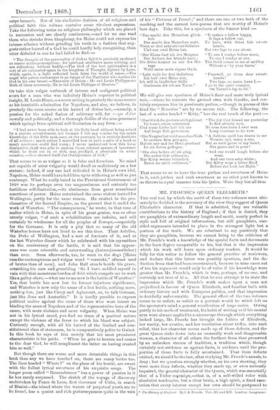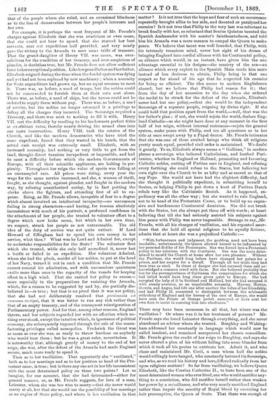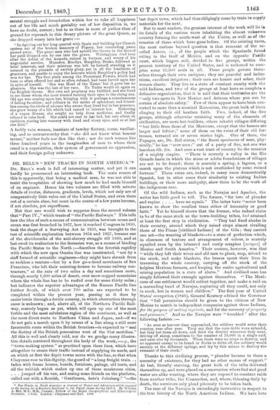MR. FR OUDE'S QUEEN ELIZABETH..
THE real test by which the merit of these two volumes must ulti- mately be decided is the accuracy of the view they suggest of Queen Elizabeth's character. If that is admitted, they are valuable contributions to the history of England ; if that is denied, they are pamphlets of extraordinary length and merit, nearly perfect in style and full of original information, but still pamphlets, one- sided arguments intended to place in the strongest light but a portion of the truth. We are reluctant to say positively that they are pamphlets, because we cannot bring to the criticism of Mr. Froude's work a knowledge of the special facts and documents in the least degree comparable to his, but that is the impression which his work will leave upon ordinary readers. It would be folly for this writer to follow the general practice of reviewers, and declare that this letter was possibly spurious, and the de- duction front that had been overstrained, because in nine cases out of ten his argument would only be of value if his knowledge were greater than Mr. Froude's, which is true, perhaps, of no one, and certainly not true of him. All that he can attempt is to state the impression which Mr. Froude's work makes upon a man not prejudiced in favour of Queen Elizabeth, and familiar both with ordinary history and with European politics, and that impression is decidedly unfavourable. The general effect of the two volumes seems to us unfair; as unfair as a portrait would be which left on the spectator's mind a general recollection of huge moles. Owing partly to his mode of treatment, his habit of writing as if his mental eyes were always applied to a microscope through which everything looked large, Mr. Froude has brought the foibles of Elizabeth, her vanity, her avarice, and her vacillation about trifles, into such relief, that her character seems made up of those defects, and the great Queen sinks down into an unusually weak and disagreeable woman, a character of all others the furthest from that preserved by an unbroken stream of tradition, a tradition which, though certainly not evidence as against facts, is evidence until the pro- portion of those facts is fully ascertained. That these defects existed, we should be the last, after studying Mr. Froude's annals, to deny; but we question strongly whether, on his own showing, they were more than defects, whether they made up, or even seriously impaired, the general character of the Queen, which was essentially that of a Tudor sogereign,—that is, of a self-willed ruler with absolutist tendencies, but a clear brain, a high spirit, a fixed reso- lution that every interest except her own should be postponed to
• The History of England. By J. A. Froude. Vols. XL and XII. London : Longtnans •
that of the people whom she ruled, and an occasional blindness as to the line of demarcation between her people's interests and her own.
For example, it is perhaps the most frequent of Mr. Froude's charges against Elizabeth that she was avaricious or even mean, that she could not bear to spend, that she starved her best servants, sent out expeditions half provided, and very nearly gave the victory to the Armada to save some trifle of treasure. That the grand-daughter of Henry VII. was mean, was over- solicitous for the condition of her treasury, and over-suspicious of plunder, is doubtless true, but Mr. Fronde does not allow sufficient force to her exceptional position. Like her grandfather and her father, Elizabeth reigned during the time when the feudal system was dying and yet had not been replaced by new machinery ; when a necessity for State expenditure had grown up, but no equal revenue to meet it. There was, as before, a need of troops, but the nobles could not be commanded to furnish them at their own cost alone. There was, as before, a need of ships, but the towns could not be ordered to supply them without pay. There was, as before, a need of service, but the nobles no longer esteemed it a privilege to defray all the charges they incurred. The Sovereign required a Treasury, and there was next to nothing to fill it with. Henry VIL met the difficulty by reselling to his landowners perfect titles at ex3rbitant rates, thereby nearly driving the armed class into one more insurrection. Henry VIII. took the estates of the Church, and like the modern democracies who have tried the same expedient, found that they wasted in his hands, that the actual cash receipt was extremely small. Elizabeth, with an increased necessity, had nothing or very little to get from the land, thought direct taxation inexpedient or impossible, and had to meet a difficulty before which the modern Governments of Europe, with all their scientific appliances, are halting in per- plexity. Throughout her reign the value of specie was falling at an unexampled rate. All prices were rising, every year the wage for the same service increased, and she, a woman of thrift, fought, as she thought, against plunder, and fought in the modern way, by refusing unauthorized outlay, by in fact putting the clerks above the fighters, and attending first of all to ex- pense. Being, as Mr. Froude allows, incapable of fear to a degree which almost involved an intellectual incapacity—no uncommon failing in strong characters—and having, for reasons absolutely inconsistent with much of his portrait, a profound confidence in the attachment of her people, she trusted to volunteer effort to a degree which now looks mean, but which in her own time, we suspect, struck her people as not unreasonable. The old idea of the duty of service was not quite extinct. If Lord Howard of Effingham had to spend his own money in her service, what then ? What was he Lord and Admiral for, except to undertake responsibilities for the State? The volunteer fleet which she trusted, while she only half accredited it, never lost a battle or failed in an expedition. Her volunteer Admiral, whom she had the pluck, amidst all her nobles, to put at the head of her Navy, turned it out in such a condition that Mr. Froude cannot conceal his admiration, and with unconscious quaintness exults more than once in the capacity of the vessels for keeping afloat in a high wind. That she carried her policy to excess— more especially in the preparations for resisting the Armada, which, for a reason to be suggested by and by, she partially dis- believed in—is true ; but that is no proof that it was not policy, that she had not deliberately resolved that parsimonia est sumnzum vectigal, that it was better to run any risk rather than that of an empty treasury, and of the consequent reinvigoration of Parliamentary power. And for that, among other reasons, England throve, and her subjects regarded her with an affection which no- thing ever shook, except the taxation which, in ignorance of political economy, she subsequently imposed through the sale of the manu- facturing privileges called monopolies. Frederick the Great was as mean as ever she was, as ready to throw burdens on anybody who would bear them ; but he was a great ruler, nevertheless. It is noteworthy that, although greedy of money to the end of her reign, she was, after the defeat of the Armada had made England secure, much more ready to spend it.
Then as to her vacillation. That apparently she "vacillated," both as to her marriage and as to her position as head of the Pro- testant cause, is true ; but is there any one act in her life inconsistent with the most determined policy on these two points ? Let us imagine, for one moment, that she had determined—either for general reasons, or, as Mr. Fronde suggests, for love of a man, Leicester, whom she was too wise to marry—that she never would marry at all, but that she would use the possibility of her marriage as an engine of State policy, and where is her vacillation in that matter? Is it not true that the hope and fear of such an occurrence repeatedly brought allies to her side, and daunted or paralyzed her enemies? Is it not true that Philip to the very last was reluctant to break finally with her, so reluctant that Sextus Quintus taunted the Spanish Ambassador with his master's faintheartedness, and told him his Armada was a mere menace to compel the Queen to make peace. We believe that taunt was well founded, that Philip, with his intensely tenacious mind, never lost sight of his dream of bringing England into cordial alliance with his Continental policy, an alliance which would, in an instant, have given him the one advantage essential to his designs—the mastery of the sea—an alliance which every exploit in the Spanish Main made him more instead of less desirous to obtain, Philip being in that one respect so far ahead of his age that he respected his enemies for being so efficient. The idea seems to modern Englishmen absurd, but we believe that Philip had reason for it ; that from the day of her accession to the day when she ordered the medal to be struck for the defeat of the Armada, Elizabeth never had but one policy,—that she would be the independent Sovereign of a separate people, reigning by divine right. If she could hold that position apart from the world,—well, that was the her father's plan ; if not, she would rejoin the world, declare Eng- land Catholic—as she might have done at any moment in the first half of her reign, without internal resistance—rejoin the general system, make peace with Philip, and see all questions as to her title at once swept away by a Papal decree. Mr. Froude intimates that she was one of those exalted beings who think all religions pretty much equal, provided civil order is maintained. We doubt it greatly. To us, Elizabeth always seems a" Gallican," in modern phrase a sovereign who believed Catholicism, and loathed Puri- tanism, whether in England or Holland, promoting and favouring Catholic nobles, cutting off Puritan ears in England, and refusing every farthing she could refuse to the States, but believing her own right over the Church to be as lofty and as sacred as that of any Pope. She would not have had the slightest difficulty, had she thought it politically expedient, in submitting herself to Swans, or helping Philip to put down a knot of Puritan Dutch rebels very like the Calvinistic Scotch. As it happened, ex- pediency was all the other way ; but she wanted to rule England, not to be head of the Protestant Cause, or to build up an expen- sive and burdensome Continental dominion. She did not break with the States, but she always put them off with words ; at heart believing that till she had seriously assisted his subjects against him peace with Philip was never impossible. Strange to say, Mr.
Fronde, with all his charges of vacillation, and his repeated asser- tions that she held all special religions to be equally fictions, admits that at heart she was a prejudiced Catholic
With forbearance and judgment, the problem need not have been insoluble ; unfortunately, the Queen allowed herself to be influenced by her personal dislike of the Protestants. She was forced into a Protestant policy in her relations with the Continent. She was the More deter- mined to mould the Church at home after her own pleasure. Without the Puritans, she would long before have changed her palace for a prison, and her sceptre for a distaff. Through all her trials they had been true as steel. In times of danger she had caressed them and ac- knowledged a common creed with them. But she believed probably that but for the peremptoriness of Calvinism the compromises for which she had toiled would have long since given quiet to Europe. She had accepted the help of it in Scotland and Holland, but she had accepted it with steady aversion, as an unpalatable necessity. Murray, Morton, Gowrie, and Angus, had felt one after another the value of her friendship, and had Philip IL consented to distinguish between the schismatic orthodoxy of England and the heresy of the rest of Europe, she would have seen the Prince of Orange perish unmoved or have sent her own fleet to assist in coercing him into obedience."
There may have been meanness in all that, but where was the vacillation ? Or where was it in her treatment of persons ? Mr. Fronde says she loved Leicester through everything, and she never abandoned an adviser whom she trusted. Burghley and Walsing- ham addressed her constantly in language which would now be called insolent, and remained unreproved her chosen councillors. Mr. Fronde gives the credit of her reign to Burghley, and says she never altered a plan of his without falling into some blunder from which it took all his genius to extricate her. Admit it, and who chose and maintained Mr. Cecil, a man whom half the nobles would willingly have hanged, who constantly lectured his Sovereign, and who, as we read his history and hers,differed radically from her upon religious matters? So far from vacillating, we believe Queen Elizabeth, like the Czarina Catherine II., to have been one of the most determined women who ever lived, one who would sacrifice any- thing to a conviction, who did sacrifice herself rather than weaken her power by a mosalliance, and who very nearly sacrificed England rather than impair the sanctity of Royal blood by executing her heir presumptive, the Queen of Scots. That there was enough of mental struggle and irresolution within her to take all happiness out of her life and much geniality out of her disposition is, we have no doubt, correct ; but to us there is more of pathos than of ground for reproach in this dreary picture of the great Queen, as she dropped weary into her grave :-
"In fighting out her long quarrel with Spain and building her Church system out of the broken masonry of Popery, her concluding years passed away. The great men who had upheld the throne in the days of her peril dropped one by one into the grave. Walsinghatn died soon after the defeat of the Armada, rained in fortune, and weary of his ungrateful service. Hunsdon, Knollys, Burghley, Drake, followed at brief intervals, and their mistress was left by herself, standing as it seemed on the pinnacle of earthly glory, yet in all the loneliness of greatness, and unable to enjoy the honours which Burghley'a policy had won for her. The first place among the Protestant Powers, which had been so often offered her and so often refused, had been forced upon her in spite of herself. She was Head of the Name,' but it gave her no pleasure. She was the last of her race. No Tudor would sit again on the English throne. Her own sad prophecy was fulfilled, and she lived to see those whom she most trusted turning their eyes to the rising sun. Old age was coming upon her, bringing with it perhaps a consciousness of failing faculties ; and solitary in the midst of splendour, and friend- less among the circle of adorers who swore they lived but in her presence, she grew weary of a life which had ceased to interest her. Sickening of a vague disease, she sought no help from medicine, and finally refused to take food. She could not rest in her bed, but sate silent on cushions, staring into vacancy with fixed and stony eyes, and so at last she died."
A. feebly vain woman, insatiate of tawdry flattery, mean, vacillat- ing, and so untrustworthy that "she did not know what honour meant," neither feels nor dies like that ; nor do such women live three hundred years in the imagination of men to whom their creed is a superstition, their system of government an oppression, and their foreign policy unknown.
•








































 Previous page
Previous page